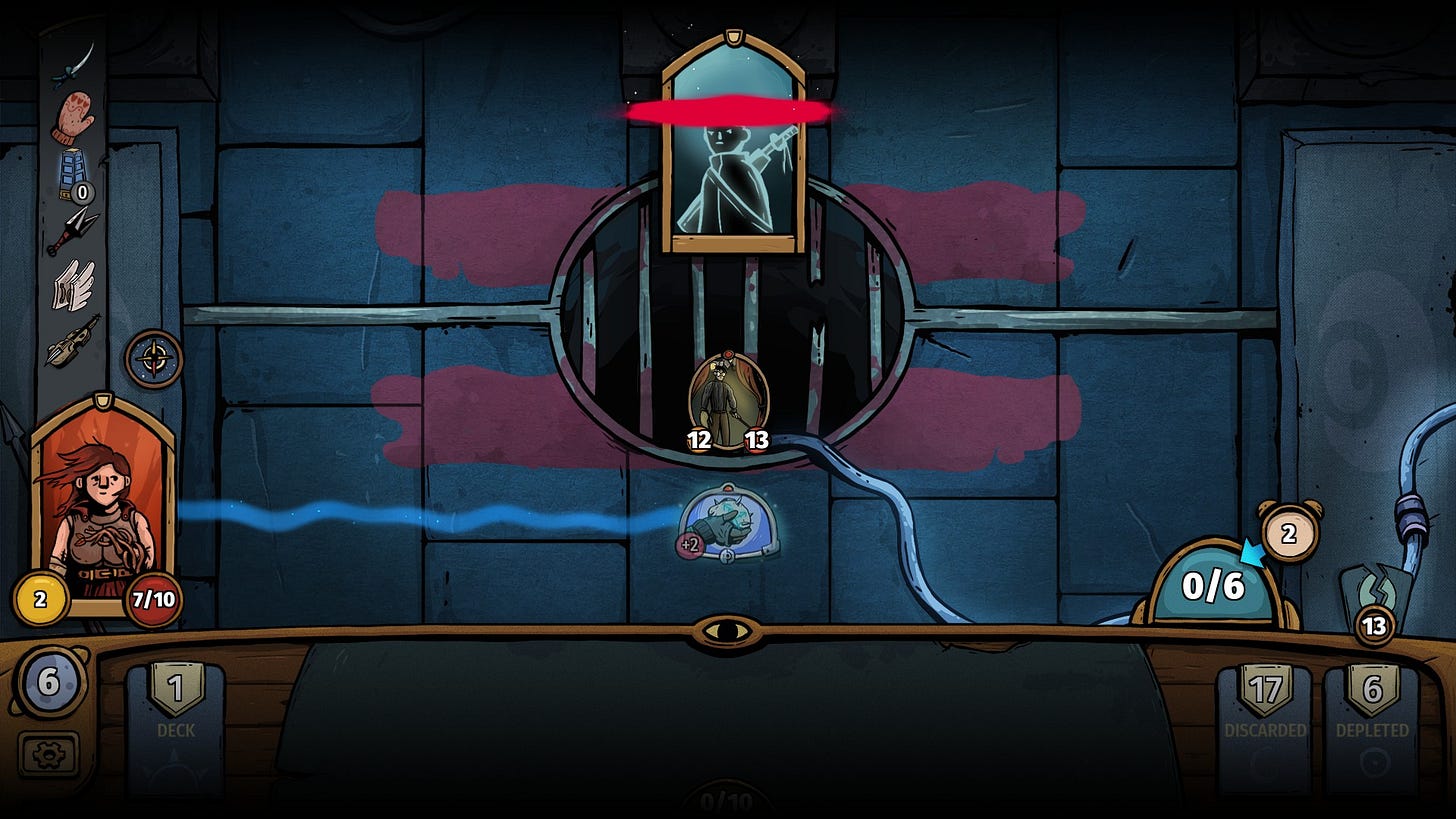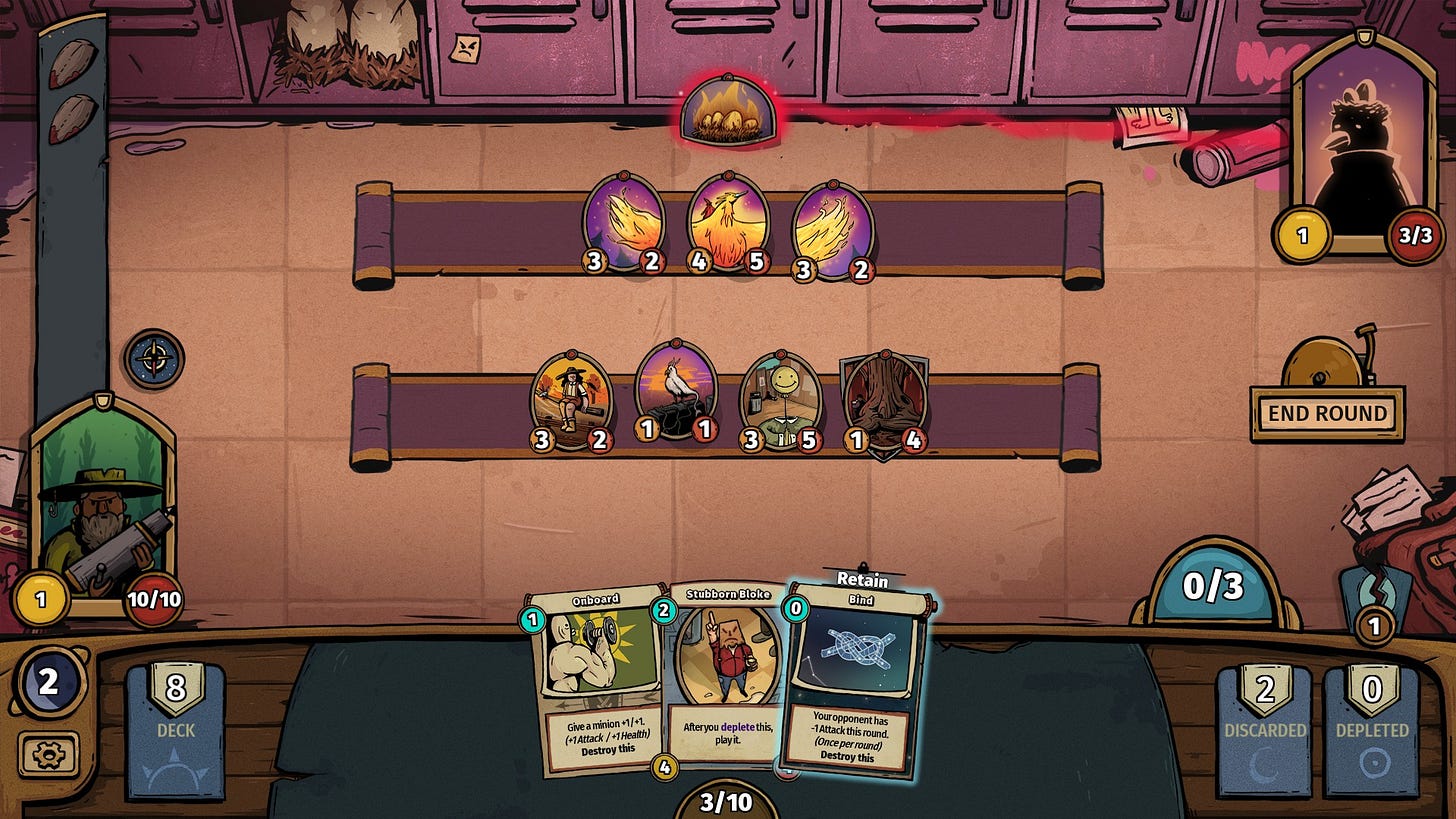Am I inside Over the Garden Wall?
Reflections on the fresh and creative single-player autobattler: Become the Moon
I just watched Over the Garden Wall for the first time this year. The combination of Elijah Wood and the art style finally convinced me to track it down. I had no idea what to expect. What I got was a sort of mature version of the Saturday morning cartoons, with oddball characters, crazy storylines and a rough overview of a plot, enough to keep it moving forward and to wrap it up nicely at the end.
But what spoke to me most about the show was the way that the world that the world that Wort and Gregory entered was both dangerous but also completely disinterested in them. There was the plot with the beast and the huntsmsan who were ostensibly on their trail, but each episode was focused on Gregory's curiosity and Wirt's desires to keep him safe in a dangerous world.
The first time I saw Become the Moon it was the aesthetic that got me. It’s like a combination of Hearthstone and Over the Garden Wall1 in a roguelike deckbuilder. This is aesthetic Peanut Butter and Chocolate for me. Two great tastes that taste great together.
Aside: Before we go too much farther, I should mention that I had the opportunity to playtest the game and received a key in the process, so there is some potential bias here.
I should also say I've never actually beaten the game because it is quite hard. I'm still incredibly charmed by it, which I think should say something.
The Game
The structure of the game is a single player roguelike deckbuilder autobattler2. Before every battle you are dealt a hand of cards that you can play spells and creatures from that will then do battle with the opponent. Your leftover creatures deal one point of damage directly, and if there is remaining health you and the opponent damage each other until one dies. The goal of course is that you have enough creatures that you never directly compete with the opponent at all.
Each time you run through your deck you get to draft more cards that get shuffled in and you redraw. The creatures on the board stay though, so you can improve them over the course of a run. The point of the game is build up a deck and a board that can take on all enemies.
The Progression
While I expected the aesthetic to be where the similarity ended, I was surprised to find that this game, like *Over the Garden Wall* was similarly indifferent to my own success and failure. Bosses weren't mere progressions in challenge but zany zigs and zags. One boss might have endless hordes of small quick attackers, while another might be focused on reviving its own pieces, while a third was full of cannons that wouldn't get damaged when they attacked. So over the course of a run I wasn't just trying to make a deck roughly "better" I was trying to make it robust and concrete. Enough that it could withstand a variety of attacks.
At the same time, the card drafting has no skip functionality. You have to add cards to your deck every time you run out. This adds to the feeling of indifference because the game doesn't care about your puny desires. Now, it gives you cards and abilities to discard or exhaust (remove completely), but it's up to you to figure out how to use them, it's never a given.
At its hardest moments the game can feel unkind and unforgiving, but the moments when I felt like I unlocked progression felt all the more earned and meaningful as a result.
The Creativity
All of this combined to create a really fresh and exciting feeling in a game. A similarly fresh and exciting feeling that I got watching *Over the Garden Wall* (ten years late...). It feels rare and special when a game so fully understands what it wants to be that it's willing to use tropes without succumbing to them, and that's what Become the Moon does here.
Most deck builders are about skill curves. You’re trying to build a deck that can escalate appropriately so that by the final boss you can come with such overwhelming force you win.
Become the Moon isn’t like that. It’s this beautiful mess of a constant stream of new cards you don’t want, enemies that seem to zig and zag once you have your head on straight it all changes again.
I don't think it will be for everyone.
I think it’s brilliant.
I know when most people think of “playing in a tv show” they think of a 1st person adventure where you literally get to inhabit the world. I think of a concept of mechanics that captures the feel of that world which typically isn’t in 3 dimensions. Like what is the resource that we care about? What are the challenges?
That’s why these two ideas fit so well together for me.
Ugh we need better genre naming conventions…




